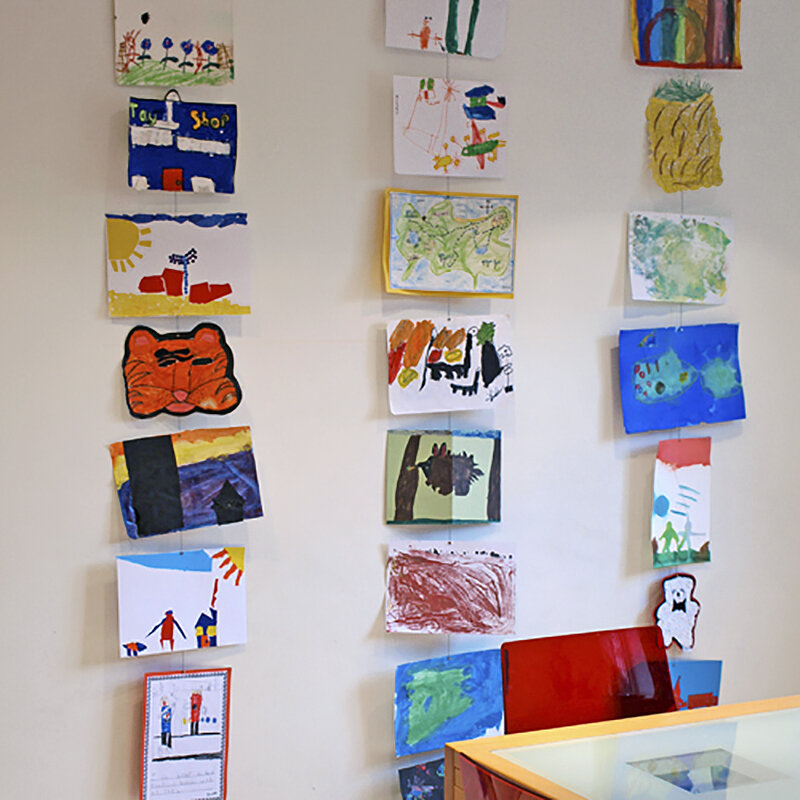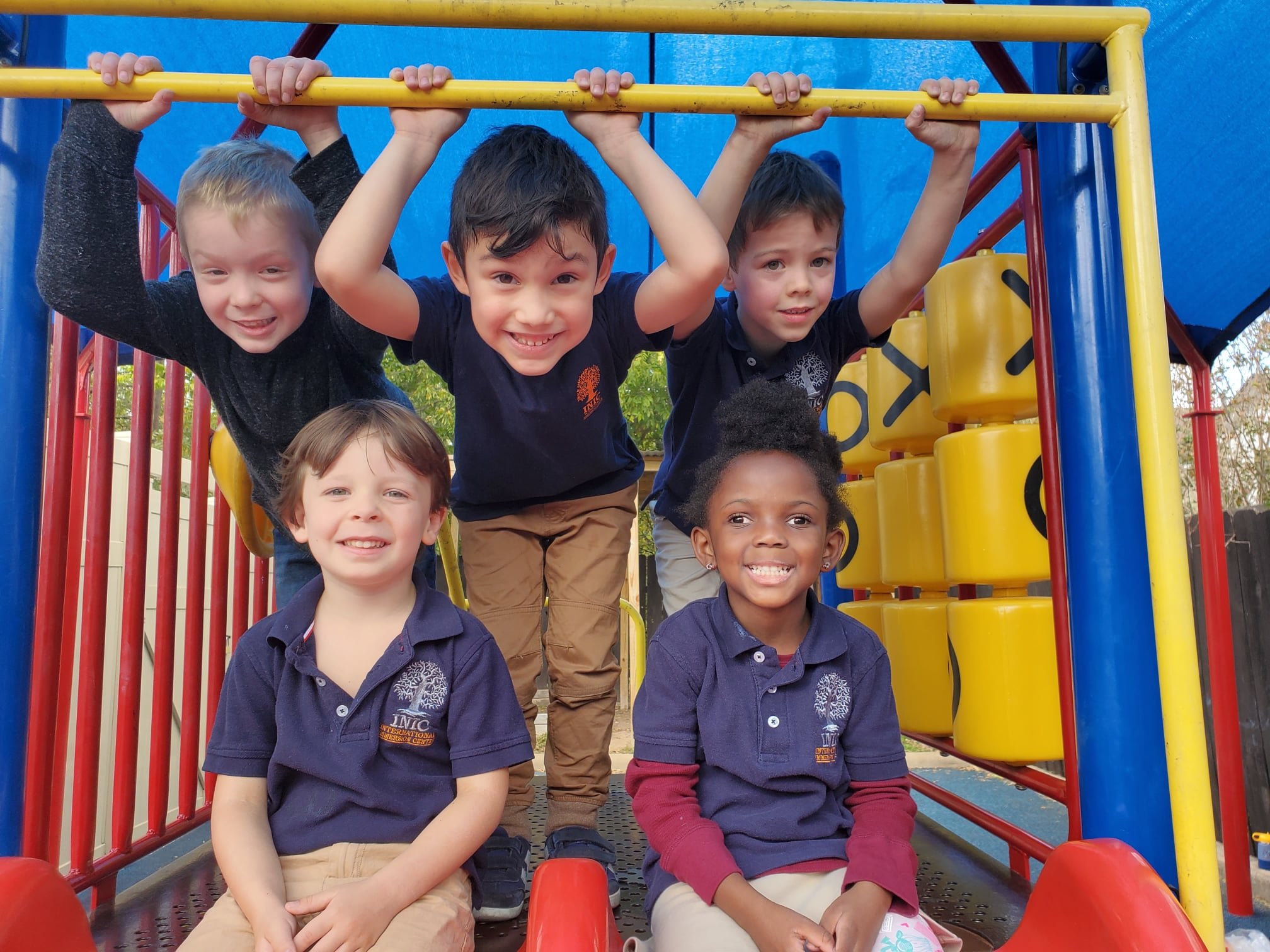
Social & Emotional Readiness
inic preschool’s early childhood
SOCIAL & EMOTIONAL Learning PROGRAM
Teaches children how their actions impact themselves and others
Helps develop critical thinking, presentation, and public speaking skills
Encourages teamwork and collaboration with others
Builds self-awareness, self-expression, self-control, and personal resilience
Social-emotional learning is just one piece of an INIC education. Learn about our evidence-based curriculum here.
Emotional Intelligence Goals
INIC students learn to identify, understand, and manage emotions in a healthy way. As a result, kids discover emotional awareness and self-regulation for behavioral growth.
Social Intelligence Goals
Students learn to understand themselves and others, and identify their place and responsibility in the world. Kids give and receive positive reinforcement, creating a nurturing classroom filled with fun and friends.
our
methods
________________
Positive Discipline
Discipline is often associated with punishment but not at INIC. When students make mistakes, misbehave, or experience emotional intensity, we consider it a learning opportunity.
INIC emphasizes self-regulation and emotional understanding. It involves praising good behavior, teaching morals, and helping kids feel invested in their classroom community. It is a growth mindset that takes the shame and punishment out of traditional discipline.
________________
Praise
Students are praised when they demonstrate good behavior. Reinforcing positive actions creates a pattern of good behavior and boosts self-esteem.
________________
Logical Consequences
Your child will learn about the cause-and-effect relationship between their behavior and outcomes. The goal is to encourage responsibility, self-discipline, and problem-solving skills.
inic’s approach to social-Emotional learning
our
classrooms
________________
Classroom Agreements
Every child is involved in caring for their classroom community, including “Give Me Five” agreements. Children practice affirmations such as:
“I am quiet.”
“I am kind and loving.”
”I sit with crossed feet.”
”I am observant.”
”I listen.”
These agreements foster responsibility, consideration for others, and the importance of self-care.
________________
Emotion Wheel
Children use the “Emotion Wheel” tool (a chart that demonstrates emotions and accompanying facial expressions) to recognize, identify, and express emotions appropriately. This tool empowers students to understand and manage feelings in a positive way.
________________
Safe Places
Every classroom has a “safe place.” Kids can reflect on things that happened and process emotions at their own pace, in a familiar environment.
our
culture
________________
Morals
Morals lay the foundation for understanding right from wrong, fairness, empathy, compassion, and social skills.
Morals are seen in pro-social behaviors such as sharing, helping, and comforting others.
INIC students learn positive ways to navigate complex relationships and build a strong ethical foundation for their future.
________________
Helper of the Day Program
Children actively contribute to their classroom community by being the “Helper of the Day.” This role encourages them to support peers and reinforces positive behaviors, creating a nurturing environment. This approach also teaches leadership skills.
________________
Diversity & Inclusion
INIC explores multicultural traditions, customs, and celebrations. Understanding culture at a young age develops empathy, respect, and a broader worldview — which leads to embracing diversity and inclusivity.
Purposeful Play impacts social-emotional learning
INIC infuses Purposeful Play, every day, in structured group and individual activity. This includes exploration, sports, games, and imagination activities. Organized play at INIC is a tool for teaching teamwork, sharing, friendship, communication, and modeling positive behavior.
Social Cognition: The understanding of one's own and others' mental states begins early, preceding language acquisition. It then progresses through infancy and preschool. Positive social cognition fosters healthy relationships.
Impact on Social & Academic Success: Strong socio-cognitive skills lead to improved communication, social competence, peer relations, academic success, and overall well-being. Conversely, weak social cognition can hinder school transitions and lead to behavioral challenges.
Promotion of Positive Behaviors: Encouraging positive interactions not only boosts social cognition but also reduces the likelihood of antisocial behaviors. This promotes healthy relationships and social interactions.
Family Influence: Parents are encouraged to play with kids at home, too. Positive family dynamics, such as secure attachment and supportive parenting, are crucial for nurturing socio-cognitive skills. Family activities, like joint pretend play and story reading with discussions, aid children's perspective-taking abilities.

INIC Preschool's Social Emotional Readiness program produces reliable results.
Emotional Intelligence, including empathy and self-awareness, can be achieved when children understand their own feelings. They also learn to be aware of classmates’ feelings.
Social Intelligence can result from disciplinary situations that involve more than one child. By learning how to self-regulate and understand the feelings of others, kids can enjoy better relationships. Social cognition is an essential concept at INIC – learning how to foster positive relationships.
1. Kids learn positive ways to handle difficult situations and feelings, rather than just learning what not to do.
2. Conflict Resolution is learned in a safe and supportive environment, resulting in a strong community and one-on-one relationships.
3. Sharing is learned by observing teachers and classmates, receiving guidance, and practicing sharing during playtime. With gentle encouragement and positive reinforcement, kids learn to understand its importance and benefits. Sharing in preschool teaches cooperation, empathy, and prepares kids for school and beyond, fostering values like kindness and generosity.
4. Leadership Skills boost independence, teamwork, self-confidence, and a sense of belonging. The Helper of the Day and Give Me Five programs provide leaderships opportunities.
5. Self Confidence Grows when kids are able to handle difficult situations.. These practices support your child's social and emotional development and promote a positive and inclusive preschool experience. Positive Discipline is a long-term method for self discovery and learning good behavior. Parents are encouraged to adopt this approach at home.
6. Friendship is priceless and “gives” to us our entire life. These foundations of healthy relationships and true friendship start at a very young age.
How Social Emotional Learning Happens
At INIC, we boost social-emotional growth by nurturing connections between the amygdala and frontal lobe, in the brain.
This innovative approach helps your child develop emotional maturity in a fun, safe, and supportive environment.







